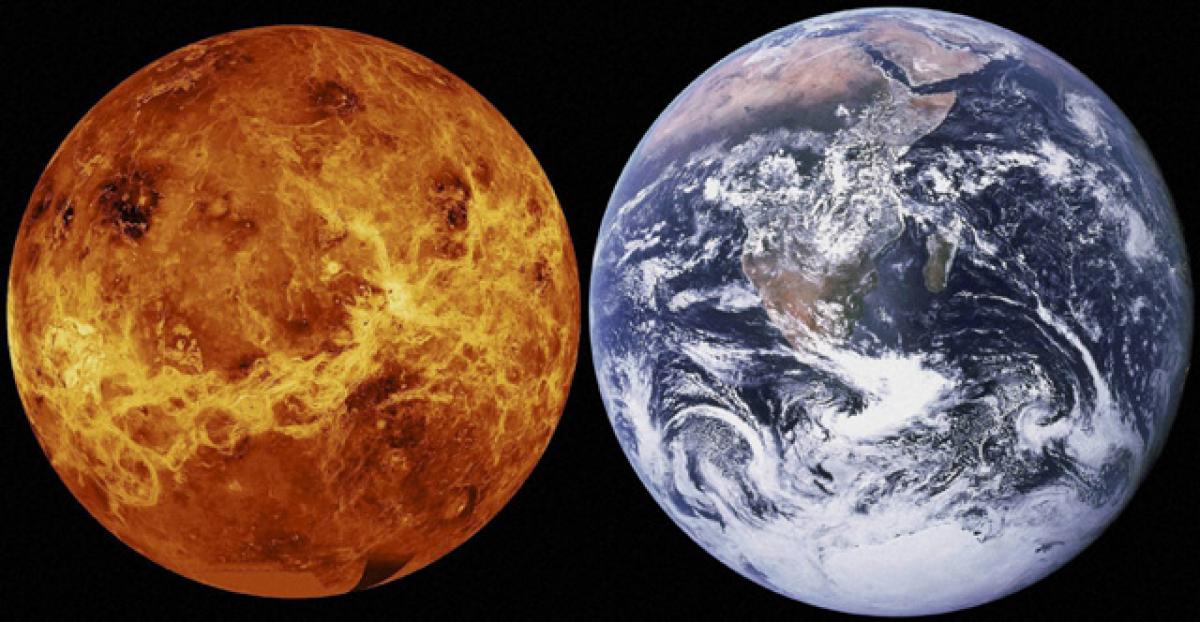Live
- UP: Police officers, govt doctors to appear virtually in courts
- White tigress Sneha dies at Nandankanan zoo
- World Liver Day 2024: Follow these easy lifestyle tips to cleanse and maintain a healthy liver
- Scholarships For Students
- What are the causes behind the increasing number of cancer cases
- Navigating Higher Education in US through scholarship
- Thrissur Pooram 2024: A Celebration of Tradition and Spirituality
- Akshaya Tritiya 2024: Date and Significance
- Kamada Ekadashi 2024: Date, Auspicious Timings And Significance
- Aamir Khan’s son Junaid wraps up filming for his second movie
Just In

ISRO looks to conquer Venus. An Indo-US deep space exploration mission is in the offing. Venus, Mars, and an asteroid all could be the next big destinations that India will be exploring.
US ready to work with India in deep space exploration
New Delhi: An Indo-US deep space exploration mission is in the offing. Venus, Mars, and an asteroid all could be the next big destinations that India will be exploring. The Indian Space Research Organisation (ISRO) is now embarking on a new planet-hunting endeavour. There are indications that the United States of America will be working with India in this `deep space exploration'.
.jpg)
Since ages, Venus has been bestowed the title of ‘Planet of Love, Wealth and Prosperity’ by the human race and it has derived its name from the Greek goddess of love and beauty. Venus is the second planet from the Sun and it is one of the hottest planets in the Solar system.
The planet appears to be a reddish orange ball when observed through a telescope during night. Situated in the neighborhood of Earth, there are quite a few spectacular similarities between both the planets and thus scientists even call Venus, the twin of Earth.
As per ISRO's own plans, in the next few years another robust mission to planet Mars is being planned by ISRO. A possible flyby to an asteroid is likely. A small satellite aptly called `Aditya' will keep a constant eye on the ever-changing moods of the Sun.
Speaking to students of Indian Institute of Technology, Chennai Richard Verma, Ambassador of USA to India, sprung a surprise by saying, "We look forward to path-breaking work between NASA [National Aeronautics and Space Administration] and ISRO on deep space exploration to Mars and beyond".
Till 2005, ISRO was a total pariah kept under full technology denial and sanctions were in full force but a decade later the chill has gone and relations have thawed, now hand in hand both want to fly `where no man has gone before'.
If Pluto was the target for the American space agency through its mission `New Horizons', the Indian space agency is also setting its goals to explore the Solar System to its limits. On ISRO's wish list `a technology demonstration mission or a flyby to the outer solar system'.
The current ISRO chief, who played a key role in the success of Mangalyaan says, "for the next planetary mission, we are looking at opportunities whether it is a repeat Mars mission, or Venus mission or even an asteroid mission' revealed Kiran Kumar, Chairman, Indian Space Research Organisation (ISRO).
Exploring Venus could be the next logical step as India has already been to Mars. It is Earth's neighbour and if all goes well in a few years an Indian rocket will lift off and head towards the inside of the Solar System. Until date only Russia, America, the European Space Agency (ESA) are the ones to have successfully reached Venus.
In 2010 Japan tried but failed. Can India make global history once again by becoming the first Asian country to reach Venus. Repeating a moment in history when India's Mangalyaan in its maiden attempt itself reached the Red Planet a feat not achieved by any other country. Venus is considered a twin of Earth and yet very little is understood about this terrestrial planet.
It is almost the same size that of Earth but it has a hugely dense atmosphere made up mostly of carbon dioxide and being closer to the Sun it has an average temperature of about 460 degrees Celsius. India has had hugely successful inter-planetary missions, the most recent being Mangalyaan that reached the Martian orbit in 2014 and continues to operate with vigour sending back scientific data to India.
The Mars Orbiter Mission or (MOM) was launched using the Polar Satellite Launch Vehicle (PSLV). Kumar says `we have demonstrated the overall capability that we can go up to Mars with a minimal launcher using the PSLV'. Therefore, a repeat mission to Mars is very likely but with a heavier satellite where scientific instruments would get priority.
Kumar says `the next mission will be science driven.' India is also seeking to undertake a visit to an asteroid and there is every possibility that India may cooperate with the American space agency, NASA on its asteroid initiative where it will try to re-direct or even harvest an asteroid.
India with its demonstrated capabilities of undertaking low cost high value inter-planetary travel - Mangalyaan at Rs 450 crore was the cheapest mission ever - offers great opportunities for NASA to work with. A possible win-win for both sides where space science would be the biggest gainer.
By Pallava Bagla

© 2024 Hyderabad Media House Limited/The Hans India. All rights reserved. Powered by hocalwire.com







